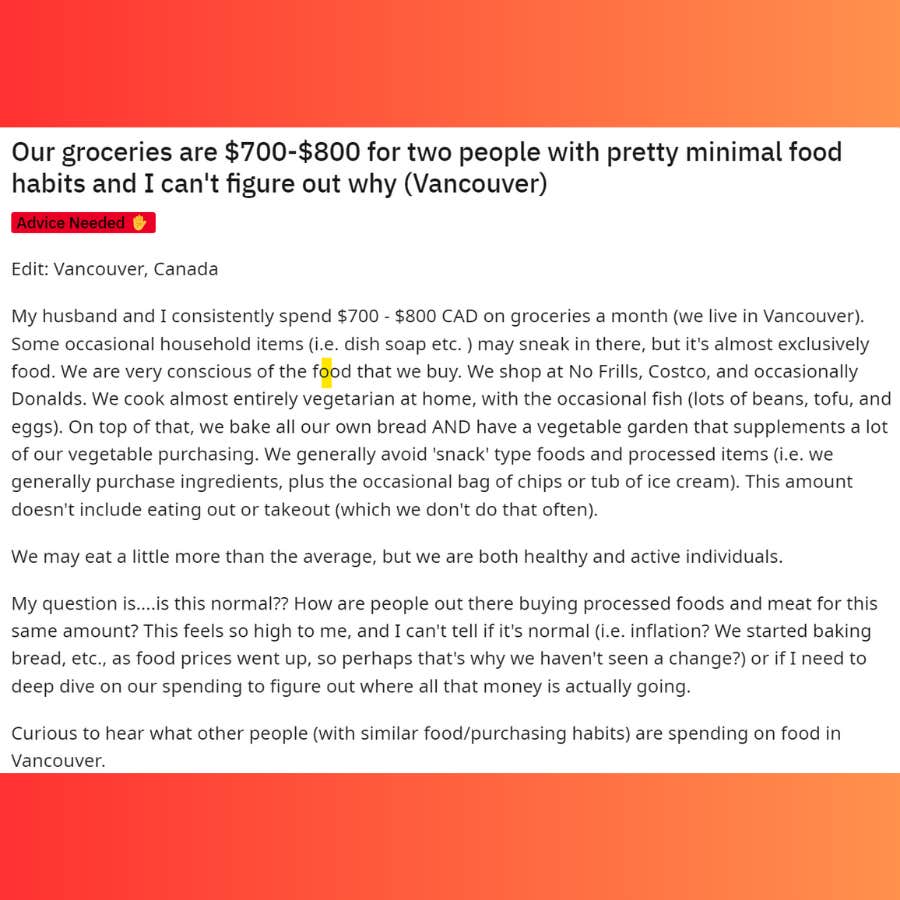Woman Is Perplexed About Why She Pays $600 Per Month For Groceries For 2 People — 'Is This Normal?'
Food costs are definitely on the rise and it's alarming.
 Drazen Zigic - Shutterstock
Drazen Zigic - Shutterstock It's no secret that everything costs more these days and if you use the Bureau of Labor Statistics (BLS) inflation calculator, you will find that between 2000 and 2023, the buying power of $100 rose to $182 for the same exact items.
Those increases are across the board, even on groceries. One Canadian woman was shocked to find that in order to feed herself and her husband, it costs about 800 CAD (about $600 USD) per month. She jumped on the r/frugal subreddit to ask other users if they thought the price of her groceries was excessive or within normal expectations.
A woman is questioning if it's 'normal' that monthly groceries for her and her husband cost nearly $600 per month.
Turning to Reddit to compare notes with commenters, the financially conscious woman admitted that they cook nearly all their vegetarian meals at home, and shop almost exclusively at budget-friendly grocery stores like Costco. Since their diet is so vegetable-heavy, they often supplement with homegrown produce, bake all their own bread and rarely buy anything pre-packaged or processed. She is simply trying to wrap her head around how foods like beans, tofu, and eggs have put such a big dent in their pockets.
"My question is ... is this normal?? How are people out there buying processed foods and meat for this same amount? This feels so high to me, and I can't tell if it's normal," she asked of her fellow Redditors.
People were skeptical about her "food consciousness" and one person commented, "Unless Vancouver is like 300% of US average, there’s definitely a lot of fat to trim in OP’s budget." Another user added, "Usually these posts end up with a lot of “one little treat” things, splurge items, high-end brand items, etc."
But the criticisms might be too harsh.
 Photo: Reddit
Photo: Reddit
Food costs have definitely gone up and the family's spending aligns with the new normal.
According to Taxback.com, it costs $400 per month to feed one person in Vancouver, BC. So it makes sense that feeding two would be double that cost. In some cases, the costs can even rise as high as $660 per person, depending on spending habits.
The impact on poor people is definitely felt when food prices skyrocket. It increases poverty and further reduces families' already low disposable income, potentially snowballing across different areas of their finances. On the flip side, for those families involved in food production, the rising costs can drastically increase their incomes.
Here are ten ways that your family can keep food costs down.
The nightmare around food security is not going anywhere any time soon, but there are some easy ways to lower costs for your own family. By implementing these habits, you can save money for times when you really need it.
1. Eat at home.
Dining out can be very expensive. Prepare your meals at home for a fraction of the cost.
2. Make a grocery list and stick to it.
It's easy to come out of the store with things you never intended to buy. Turn on your tunnel vision and stay dedicated to your list.
3. Never shop hungry.
Shopping while you are hungry has been scientifically shown to compel you to spend more. Snack before you enter the grocery store.
4. Buy your food in bulk.
Stores like Costco can save you money by allowing you to get your food items in bulk. Family-size packages cost less per unit than smaller items.
5. Bypass the convenience foods.
If you have kids, you know that the moment a pack of Oreos enters the home, they inhale the cookies. Less convenient food requires more effort but lasts much longer.
6. Leave your kids at home.
"Can I have...?" is one of the most annoying questions to hear while shopping, To avoid undue pressure and unplanned spending do not take the kiddos shopping.
7. Clip coupons and use rewards.
Most grocery stores have a rewards program that gives you 'bonuses' for shopping and resourceful coupons. Download your store's app and save on things you were going to buy anyway.
8. Don't be tempted at checkout.
There's a reason the area surrounding the cash register is packed with snacks and goodies. Look away and remember your mission.
9. Comparison shop.
Look for sales or stores that have what you need for less.
10. Don't shop randomly.
Avoid spontaneous trips to the store. Plan out the ingredients you need to make meals for a specified amount of time and only head back to restock when it's time.
These suggestions can help, but if you are facing food insecurity, additional help is available. Here is a list of food banks across the United States and Canada.
NyRee Ausler is a writer from Seattle, Washington. She covers lifestyle, relationships, and human-interest stories that readers can relate to and that bring social issues to the forefront for discussion.
